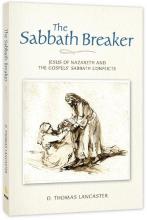The Sabbath Breaker

I have been doing a lot of teaching on the four primary responsibilities of a disciple lately. One of the responsibilities of a disciple is to memorize and properly interpret the words of one’s rabbi. As I have shared, misinterpreting the words of one’s rabbi can have disastrous results. One of these disastrous results was when the Gentile leadership of the church misunderstood Jesus’ relationship to the Sabbath. As is stated in the preface of the book, this book does not address issues of Sabbath and Gentiles, nor does it address issues of Saturday verses Sunday Sabbath. The Sabbath Breaker by D. Thomas Lancaster has one goal in mind: exonerating Jesus of two thousand years of accusations of being a Sabbath breaker. If you are striving to be a fully devoted disciple of Jesus, then this topic is one of the things that we must consider carefully. The Sabbath Breaker addresses this serious disconnect between the teachings of Jesus and his disciples’ (mis)understanding and (mis)application of them.
The opponents of Jesus claimed, “This man is not from God, for he does not keep the Sabbath” (John 9:16). Throughout the Gospel narratives, his critics labeled him a Sabbath breaker and attempted to have him drawn up on charges as such. But, as D. Thomas Lancaster asks, “Do we appreciate the gravity of this allegation?” (p. 7). “The same allegation is still being lodged against Jesus nearly two thousand years later. ‘Jesus broke the Sabbath!’ But this time it is his followers, not his enemies, who accuse him of Sabbath breaking. Why are Christian interpreters so eager to affirm the Pharisees’ allegations against our Master?” (p.8).
For the most part both Christianity and Judaism believe that the Gospels record the fact that Jesus intentionally broke the Sabbath in order to show its cessation. Christian teachers and theologians commonly reference his many Sabbath conflicts as proof of his attempts to cancel the Torah’s Sabbath restrictions (along with the rest of the Torah as well).
Lancaster makes a bold proposition that needs to be heard:
“Every Christian reader should understand the absurdity of this proposition. A Messiah who breaks the Sabbath, and advocates breaking the Sabbath is no Messiah at all. He is a false Christ and a deceiver. God himself commands the Jewish people to reject such a Messiah” (p.9).
Think about it … It’s a serious sin for a Jew to violate (and worse yet attempt to cancel) the Sabbath. Therefore, if Jesus actually did violate the Sabbath and his accusers are correct in saying that he was a Sabbath breaker, then they not only had grounds for his stoning, they could prove that he was not sinless, but a lawbreaker and a sinner. Therefore, he should also be dismissed even as a candidate as the Messiah of Israel. This should be a serious red flag for any follower of Jesus, and evoke sincere concern for this unresolved problem. Should we continue to be a voice of accusation against him, or should we look for ways to exonerate our Master?
D. T. Lancaster took such concerns seriously and began researching and writing on this topic. A natural outflow of his findings which have peppered the pages of Torah Club Volume 4, The Chronicles of Messiah, Lancaster pulls together all of his findings and places them into one easily accessible source: The Sabbath Breaker. In The Sabbath Breaker, Lancaster asks the difficult questions as to whether or not Jesus was actually a Sabbath breaker and whether or not his opponents had legitimate grounds for accusation against him. He looks at the seriousness of these accusations, the full weight of the allegations, the technical difficulties revolving around each Sabbath conflict and then goes into great detail working from a simple premise to show Jesus’ consistent rationale for his actions.
Lancaster goes beyond the mere surface issues and even delves into the questions surrounding Jesus’ relationship to Jewish halacha (legal rulings) in regard to the Sabbath. As followers of Jesus, we need to see whether Jesus upheld rabbinic strictures regarding the Sabbath or if he favored a sola scriptura approach to honoring the Sabbath. Oftentimes Sabbatarians are quick to defend Jesus in regard to the Sabbath, but only to the point of saying that his Sabbath violations were in contempt of rabbinic ordinances. But is this truly the case?
In Judaism there are thirty-nine categories of melachah (prohibited labor) associated with the Sabbath and most non-Jews feel these are a bit extreme. However, as Lancaster denotes, Judaism “needed a precise definition for the word because the Torah prescribed a death penalty for the Israelite who performed melachah on the Sabbath. Unless the word had tight, legal definition, such cases could only be decided arbitrarily and capriciously” (p.22).
Did Jesus deny he and his disciples breaking the Sabbath? Did he claim the rabbinic prohibitions to be far fetched? How did his example of David eating the consecrated bread and the priests performing their Temple duties help him to make his case? How do they justify his and his disciples’ actions? Rather than throwing out the rabbinic definitions of prohibited labor, how does Jesus work within the framework of halachic Judaism to make his points? We should be asking ourselves these questions and more when we study these passages within the Gospel narratives.
In conclusion, we have a choice between joining his accusers and contributing to the continuing rejection of Jesus by his Jewish brethren. I encourage you to do your homework on this serious subject, wrestle through these allegations with D. Lancaster and join the ranks within a small, but growing voice working towards vindicating our Master, our Rabbi, our Messiah from these allegations.
In conclusion, Lancaster’s introductory remarks make for a good summary:
“This book is about revealing one of the central teachings of Jesus: the priority of love for one’s neighbor … Jesus loved the Sabbath, but he loved his fellow human beings even more than the Sabbath.” (p.14)








